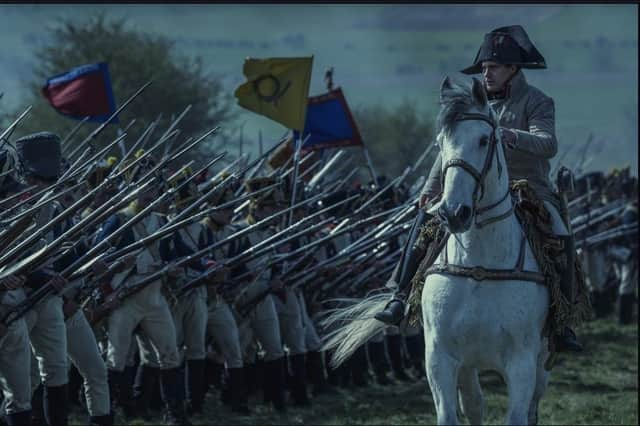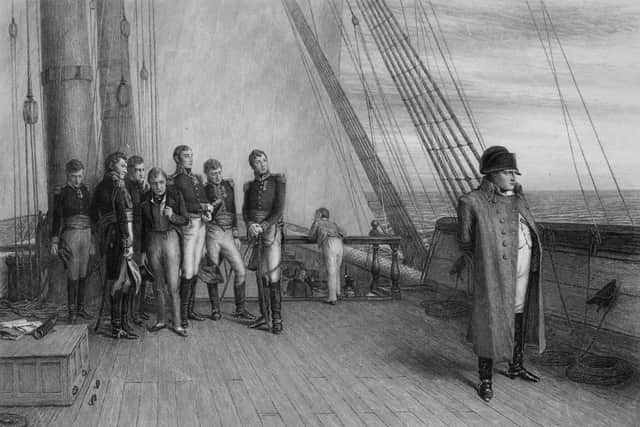Napoleon Bonaparte: How Scots played a key role in the downfall of the French leader – Susan Morrison


Bonaparte would have been delighted. His name is everywhere. He gazes down balefully from billboards worldwide. It's not his face to be fair, but it's an A-list movie star with an Oscar to his name. Boney wouldn’t have known what that meant, but an entire film about him would have pleased him immensely. Well, better than being a sidekick for Bill and Ted in their excellent adventure.
It's fair to say that he wasn’t a fan of the British, and really didn’t like the English. It's possible that he didn’t distinguish much between the nations of the United Kingdom, but then, neither did Nelson. After all, it was “England expects”, despite the fact that the Royal Navy was a truly national institution. Ships drew crews from all over the UK, unlike the army with its locally sourced regiments. Many Scots served at sea and rose to prominence and command, even if they couldn’t always be understood.
Advertisement
Hide AdAdvertisement
Hide AdAt the Battle of Camperdown, Captain John Inglis of HMS Belliqueux, not a man for paperwork, gave up reading the orders and threw them to the deck bellowing, “Damn me, up wie the hellem an’ gang into the middle o’ it.” We won.
Napoleon had an early tussle with a Scot on land, at Toulon in 1793, although he probably didn’t know it. Edinburgh-born Sir David Dundas was second-in-command at the siege. Bonaparte’s careful mapping of the battlefield and brilliant use of artillery not only gave the Revolutionary Army of France a stunning victory, it boosted Napoleon's career and was the background for a belter of a portrait.
Napoleon understood something of Scotland, since by his side stood Jacques Étienne Joseph Alexandre Macdonald (1765-1840), the son of a Jacobite refugee who rose to be a Marshall of the French Empire. Napoleon knew very well where General Macdonald came from. He feared, he said, to let Macdonald hear the bagpipes, lest Etienne defect and join the British. Bonaparte possibly didn’t follow all of the nuances of the Jacobite cause.
General Macdonald was clearly highly trusted by Napoleon. Bonaparte sent him to fight beside and probably protect his stepson Eugene de Beauharnais. Unfortunately, Étienne, the son of a revolutionary, had a most unfortunate habit of speaking his mind. He had a reputation for a sharp tongue, a savage wit and fell out with everyone. Well, you know what they say about taking the boy out of Scotland… Someone thought it a good idea to send General Macdonald on diplomatic missions, which were just as successful as you’d expect from a man nicknamed “His Outspokenness”. Despite all that, he died a hero not just of Revolutionary France, but also of the restored Bourbon regime.
Napoleon faced Scots on many battlefields, in many armies, and, of course, at sea. Bonaparte hated one so much, he called him “le Loup des Mers”. The Sea Wolf. He was Admiral Thomas Cochrane, the inspiration behind the ‘Master and Commander’ novels and the film.


He was born in December 1775 just outside Hamilton. In 1793, he joined the navy as a midshipman, and by 1801 commanded the brig HMS Speedy. He took on the Spanish ship El Gamo, a frigate that massively out-gunned and out-manned the Speedy. No matter. He deployed his guns masterfully and stormed the ship, taking it as a prize. Later he took, burned or drove ashore over 50 French ships. He was a hero, and would probably have been much better known if he hadn’t fallen out with everyone. Another one.
He was infamous for not suffering fools gladly. He faced a court martial for being ‘flippant’ to a junior officer and fought a duel with a French Royalist who had been rude to him. Why he thought going into politics was a good idea is anyone's guess. He made enemies, was accused of fraud, found guilty and imprisoned. Cochrane fought back and was eventually pardoned, later serving in the navies of Chile and Brazil. It’s worth a trip to Culross to see his monument, flanked by the flags of nations who venerate him, and his uniform is on display at the National Museum of Scotland on Chambers Street.
In 1805 at Trafalgar, a plucky British ship-of-the-line took an utter pounding. She was called HMS Bellerophon, but that was too fancy a name for her crew, who called her “Billy Ruffian”. She lost her captain, John Cooke, and nearly 30 crew in the desperate hand-to-hand fighting. More than 100 men lay wounded on her decks.
Advertisement
Hide AdAdvertisement
Hide AdHer last captain took command on April 9, 1815. His name was Frederick Lewis Maitland, and he was a Fifer, born in Rankeillor in 1770. Napoleon was at large in Europe again. He’d broken out of his island prison on St Elba and gambled on a comeback campaign that had ended in defeat at Waterloo.
He was being hunted through France. Back-channel contacts between the British and French had opened the possibility of Napoleon being allowed to live out his life in America, if he surrendered to the British. Early on the morning of July 15, 1815, HMS Billy Ruffian sat at anchor off the French port of Rochefort. The ship's company assembled, the marines slammed to attention, and the bo’sun piped aboard Napoleon Bonaparte.
He walked to Captain Maitland, removed his hat and said in French: “I am come to throw myself on the protection of your Prince and your laws.” Bonaparte was standing on the quarterdeck that, at Trafalgar, ran with blood.
Maitland gave a gentle bow, politely offered to take the ex-emperor on a tour of the ship, and gave orders to set sail for England. A Scot had taken the final surrender of the man they still make films about.
Comments
Want to join the conversation? Please or to comment on this article.
